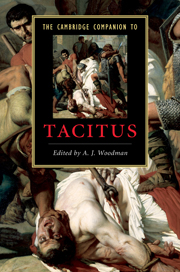1 - From the annalists to the Annales: Latin historiography before Tacitus
from Part I - Contexts
Published online by Cambridge University Press: 28 March 2010
Summary
What, one wonders, was in the history section of Tacitus' library? At the core of the Greek section, we may safely assume, would reside Herodotus, Thucydides and Xenophon, with Polybius close by. Interestingly enough, however, in his extant writings Tacitus finds no occasion to mention any of these authors (Xenophon is mentioned once, as a philosopher, at D. 31.6); and his debt to the Greek historiographical tradition has never been fully explored - largely because it is not at all clear how great that debt is (in distinct contrast to his predecessors Sallust and Livy, whose respective debt to Thucydides and Herodotus is mentioned explicitly by Quintilian, Inst. 10.1.101). Rather, the influences at work on Tacitus seem to lie more substantially and understandably on the Latin side. Yet even here the list of Roman historians actually named by Tacitus is markedly circumscribed: no early annalist receives mention. In fact, with the exception of Julius Caesar (and two references to the Sullan historian Cornelius Sisenna), he names no historian prior to Sallust and Livy. The historical work of Asinius Pollio receives cursory notice, most significantly in the great speech of the historian Cremutius Cordus at A. 4.34.4. With respect to those writing after Livy, in the Annals Tacitus identifies as sources for various pieces of information Pliny the Elder, Cluvius Rufus and Fabius Rusticus, as well as the memoirs of Agrippina the Younger and the Neronian general Domitius Corbulo.
- Type
- Chapter
- Information
- The Cambridge Companion to Tacitus , pp. 17 - 30Publisher: Cambridge University PressPrint publication year: 2010
- 2
- Cited by

